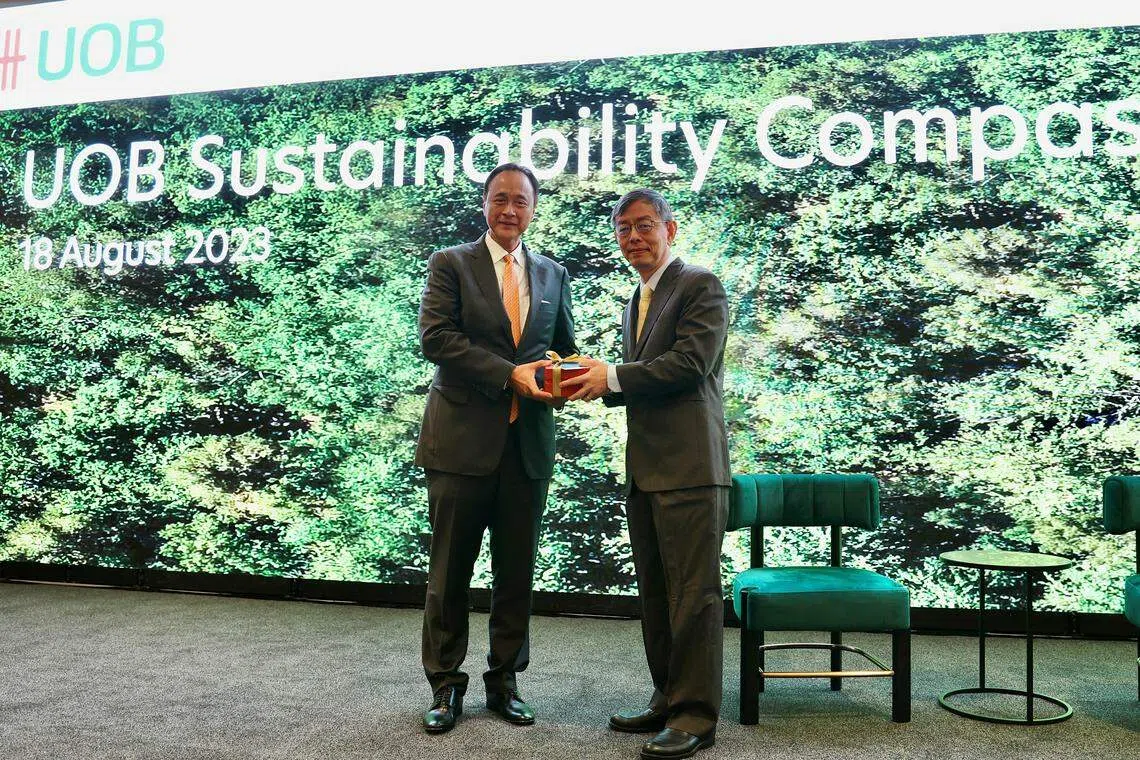SMEs to get carbon-accounting funding support by year-end

SMALL and medium-sized enterprises (SMEs) will get funding support to measure their carbon footprints by the end of this year.
Announcing this at a UOB-organised forum on Friday (Aug 18), Enterprise Singapore chairman Peter Ong said the support, which will come under the government’s Productivity Solutions Grant scheme, will help SMEs assess their Scope 1 and 2 emissions.
Scope 1, a widely-used classification under the Greenhouse Gas Protocol Corporate Standard, refers to operational emissions arising from sources that the company controls and owns; Scope 2 emissions are those tied to the entity’s energy consumption.
This comes with the recognition that SMEs, as part of global supply chains, will increasingly be asked to report their Scope 1 and 2 emissions. These emissions are in turn factored into the Scope 3 emissions of large corporates pressured to green their supply chains, said Ong, who was delivering the keynote speech at the UOB Sustainability Compass Forum.
Scope 3 emissions are those arising from a company’s entire value chain, including those from suppliers, customers and employees. Global standard-setting institution International Sustainability Standards Board (ISSB) recently confirmed that disclosure of such emissions is required.
SMEs thus face near-term pressures to disclose their emissions figures and lower them – all the more as the mandatory climate reporting regime proposed last month (by a committee convened by the Accounting and Corporate Regulatory Authority, or Acra, and Singapore Exchange) is aligned with ISSB standards.
A NEWSLETTER FOR YOU

ESG Insights
An exclusive weekly report on the latest environmental, social and governance issues.
Speaking at a panel discussion following Ong’s speech, Kuldip Gill, the assistant chief executive of Acra’s accounting and compliance group, said the upcoming requirements’ impact on SMEs will be considerable, whether the regulatory changes hit them directly.
The committee’s proposal to roll out the regime on all listed issuers from their 2025 financial year means that about 465 listed SMEs will have “no choice” but to report their emissions, she noted. The 465 make up 70 per cent of all listed entities.
It has been proposed that non-listed companies with an annual revenue of at least S$1 billion comply with the reporting requirement by their 2027 financial year. And while SMEs are not a part of this group, Gill said they will be affected as well because of these large companies’ Scope 3 requirements.
“Even though you’re not mandated to comply with climate reporting, you may be requested information in terms of climate, data or other kinds of information as part of the value chain,” she added.
Already, some SMEs are feeling the effects of regulatory changes elsewhere, said fellow panellist Lee Bing Yi, partner for sustainability and climate change and financial services assurance at PwC Singapore.
He disclosed that one client providing logistics services almost lost one of its biggest European customers about a year ago, as environmental, social and governance (ESG) demands made their way into supplier screening and evaluation processes.
Ong also spoke about the changing requirements in Europe, including the Carbon Border Adjustment Mechanism (CBAM), which kicked in on May 16. CBAM is a carbon tariff on carbon-intensive products, such as cement, imported by the European Union (EU).
From 2026, EU importers will be required to declare and pay for carbon emissions embedded in their imports, he noted. This will impact companies further up in the value chain that supply to these EU importers, because those upstream companies will likely be asked to report the embedded carbon emissions of their products, he said.

Ong urged SMEs not to view sustainability as a cost centre, given that consumers are already demanding sustainable products.
Fleet transitioning
At the event, UOB launched a new fleet-transitioning solution to help companies in the logistics sector make the transition towards greener and more fuel-efficient vehicles.
The solution arose from the bank’s recognition that companies are still in wait-and-see mode, even amid rising adoption of electric vehicles and improvements to infrastructure, models and pricing.
UOB told The Business Times that it is telling its logistics-sector customers that their loan rate can be reduced by up to double-digit basis points if, for example, they lower their emissions level or meet other targets.
The solution also includes an eligibility guide, which the bank developed with an ESG consultant. Logistics players who are bank customers can use the guide to set reduction targets without needing to hire external consultants. With the guide serving as a tool and reference point for customers, enterprises can potentially save between S$50,000 and S$100,000 in fees that would otherwise be paid to consultants to monitor and reduce their emissions, the bank said.
KEYWORDS IN THIS ARTICLE
BT is now on Telegram!
For daily updates on weekdays and specially selected content for the weekend. Subscribe to t.me/BizTimes
ESG
Australian startup Hysata mimics trees to make cheaper green hydrogen
Nuanced approach needed in using carbon credits to offset Scope 3 emissions
Cut aid for livestock farms to help climate fight, World Bank says
US, Chinese climate negotiators meeting on greenhouse gas curbs
Market-based schemes not reducing deforestation, poverty: report
South-east Asia ESG bonds issuance up 27.4% in Q1 2024 to US$5.1 billion
